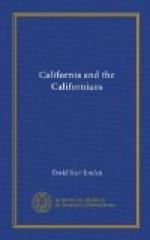So far as man is concerned, the one essential fact is that he is never the climate’s slave; he is never beleaguered by the powers of the air. Winter and summer alike call him out of doors. In summer he is not languid, for the air is never sultry. In most regions he is seldom hot, for in the shade or after nightfall the dry air is always cool. When it rains the air may be chilly, in doors or out, but it is never cold enough to make the remorseless base-burner a welcome alternative. The habit of roasting one’s self all winter long is unknown in California. The old Californian seldom built a fire for warmth’s sake. When he was cold in the house he went out of doors to get warm. The house was a place for storing food and keeping one’s belongings from the wet. To hide in it from the weather is to abuse the normal function.
The climate of California is especially kind to childhood and old age. Men live longer there, and, if unwasted by dissipation, strength of body is better conserved. To children the conditions of life are particularly favorable. California could have no better advertisement at some world’s fair than a visible demonstration of this fact. A series of measurements of the children of Oakland has recently been taken, in the interest of comparative child study; and should the average of these from different ages be worked into a series of models from Eastern cities, the result would surprise. The children of California, other things being equal, are larger, stronger and better formed than their Eastern cousins of the same age. This advantage of development lasts, unless cigarettes, late hours, or grosser forms of dissipation come in to destroy it. A wholesome, sober, out-of-door life in California invariably means a vigorous maturity.
A third element of charm in California is that of personal freedom. The dominant note in the social development of the state is individualism, with all that it implies of good or evil. Man is man in California: he exists for his own sake, not as part of a social organism. He is, in a sense, superior to society. In the first place, it is not his society; he came from some other region on his own business. Most likely, he did not intend to stay; but, having summered and wintered in California, he has become a Californian, and now he is not contented anywhere else. Life on the coast has, for him, something of the joyous irresponsibility of a picnic. The feeling of children released from school remains with the grown people.
’A Western man,” says Dr. Amos Griswold Warner, “is an Eastern man who has had some additional experiences.” The Californian is a man from anywhere in America or Europe, typically from New England, perhaps, who has learned a thing or two he did not know in the East, and perhaps, has forgotten some things it would have been as well to remember. The things he has learned relate chiefly to elbow room, nature at first hand and “the unearned increment.” The thing that he is most likely to forget is that the escape from public opinion is not escape from the consequences of wrong action.




